#give me Liberty or give me Death speech
Explore tagged Tumblr posts
Text
“No man thinks more highly than I do of the patriotism, as well as abilities, of the very worthy gentlemen who have just addressed the House. But different men often see the same subject in different lights; and, therefore, I hope it will not be thought disrespectful to those gentlemen if, entertaining as I do opinions of a character very opposite to theirs, I shall speak forth my sentiments freely and without reserve. This is no time for ceremony. The questing before the House is one of awful moment to this country. For my own part, I consider it as nothing less than a question of freedom or slavery; and in proportion to the magnitude of the subject ought to be the freedom of the debate. It is only in this way that we can hope to arrive at truth, and fulfill the great responsibility which we hold to God and our country. Should I keep back my opinions at such a time, through fear of giving offense, I should consider myself as guilty of treason towards my country, and of an act of disloyalty toward the Majesty of Heaven, which I revere above all earthly kings.
“Mr. President, it is natural to man to indulge in the illusions of hope. We are apt to shut our eyes against a painful truth, and listen to the song of that siren till she transforms us into beasts. Is this the part of wise men, engaged in a great and arduous struggle for liberty? Are we disposed to be of the number of those who, having eyes, see not, and, having ears, hear not, the things which so nearly concern their temporal salvation? For my part, whatever anguish of spirit it may cost, I am willing to know the whole truth; to know the worst, and to provide for it. I have but one lamp by which my feet are guided, and that is the lamp of experience. I know of no way of judging the future but by the past. And judging by the past, I wish to know what there has been in the conduct of the British ministry for the last ten years to justify those hopes with which gentlemen have been pleased to solace themselves and the House. Is it that insidious smile with which our petition has been lately received? Trust it not, sir; it will prove a snare to your feet. Suffer not yourselves to be betrayed with a kiss. Ask yourselves how this gracious reception of our petition comports with those warlike preparations which cover our waters and darken our land. Are fleets and armies necessary to a work of love and reconciliation? Have we shown ourselves so unwilling to be reconciled that force must be called in to win back our love? Let us not deceive ourselves, sir. These are the implements of war and subjugation; the last arguments to which kings resort. I ask gentlemen, sir, what means this martial array, if its purpose be not to force us to submission? Can gentlemen assign any other possible motive for it? Has Great Britain any enemy, in this quarter of the world, to call for all this accumulation of navies and armies? No, sir, she has none. They are meant for us: they can be meant for no other. They are sent over to bind and rivet upon us those chains which the British ministry have been so long forging. And what have we to oppose to them? Shall we try argument? Sir, we have been trying that for the last ten years. Have we anything new to offer upon the subject? Nothing. We have held the subject up in every light of which it is capable; but it has been all in vain. Shall we resort to entreaty and humble supplication? What terms shall we find which have not been already exhausted? Let us not, I beseech you, sir, deceive ourselves. Sir, we have done everything that could be done to avert the storm which is now coming on. We have petitioned; we have remonstrated; we have supplicated; we have prostrated ourselves before the throne, and have implored its interposition to arrest the tyrannical hands of the ministry and Parliament. Our petitions have been slighted; our remonstrances have produced additional violence and insult; our supplications have been disregarded; and we have been spurned, with contempt, from the foot of the throne! In vain, after these things, may we indulge the fond hope of peace and reconciliation. There is no longer any room for hope. If we wish to be free– if we mean to preserve inviolate those inestimable privileges for which we have been so long contending–if we mean not basely to abandon the noble struggle in which we have been so long engaged, and which we have pledged ourselves never to abandon until the glorious object of our contest shall be obtained–we must fight! I repeat it, sir, we must fight! An appeal to arms and to the God of hosts is all that is left us!
“They tell us, sir, that we are weak; unable to cope with so formidable an adversary. But when shall we be stronger? Will it be the next week, or the next year? Will it be when we are totally disarmed, and when a British guard shall be stationed in every house? Shall we gather strength by irresolution and inaction? Shall we acquire the means of effectual resistance by lying supinely on our backs and hugging the delusive phantom of hope, until our enemies shall have bound us hand and foot? Sir, we are not weak if we make a proper use of those means which the God of nature hath placed in our power. The millions of people, armed in the holy cause of liberty, and in such a country as that which we possess, are invincible by any force which our enemy can send against us. Besides, sir, we shall not fight our battles alone. There is a just God who presides over the destinies of nations, and who will raise up friends to fight our battles for us. The battle, sir, is not to the strong alone; it is to the vigilant, the active, the brave. Besides, sir, we have no election. If we were base enough to desire it, it is now too late to retire from the contest. There is no retreat but in submission and slavery! Our chains are forged! Their clanking may be heard on the plains of Boston! The war is inevitable–and let it come! I repeat it, sir, let it come.
“It is in vain, sir, to extenuate the matter. Gentlemen may cry, Peace, Peace– but there is no peace. The war is actually begun! The next gale that sweeps from the north will bring to our ears the clash of resounding arms! Our brethren are already in the field! Why stand we here idle? What is it that gentlemen wish? What would they have? Is life so dear, or peace so sweet, as to be purchased at the price of chains and slavery? Forbid it, Almighty God! I know not what course others may take; but as for me, give me liberty or give me death!”
* William Wirt (1772-1834) reconstructed this accepted text of Patrick Henry’s “Liberty or Death” speech for his biography of Patrick Henry. Wirt’s Sketches of the Life and Character of Patrick Henry was published in 1817 and reprinted about two dozen times in the nineteenth-century. Historians and biographers have often debated the merits and limits of William Wirt’s reconstruction of the text.
#liberty or death#Patrick Henry#speech#U.S. history#history#give me Liberty or give me Death speech#independence
2 notes
·
View notes
Text
youtube
0:01 / 2:34
Walking Dead's Norman Reedus: Liberty or Death credit to THNKR
#norman reedus#give me liberty or give me death#historic speech#monologues#daryl dixon#literary quotes#freedom#Youtube
13 notes
·
View notes
Note
Hi Neil! I was wondering is was "give me coffee or give me death" by any chance a reference to the "tea and cake or death" sketch by Eddie Izzard?
No it is a reference to Patrick Henry's speech during the American revolution, on "give me liberty or give me death".
2K notes
·
View notes
Link
Somebody kindly liked this post (I enjoy when people dig up old posts I have written and show some appreciation, and I try to do the same for others).
I have decided to reblog my own post just to comment on the comparative silence concerning China's totalitarian abuse of Hong Kong's legal system. I don't keep up with news in the Far East as often as I do news in Europe and the Middle East, but I have not heard anything to suggest that these speech therapists were released from prison.
I certainly have not heard of any university students in the West deciding to set up tents outside public buildings and demand divestment from China because of China's verified human rights abuses and denial of the indigenous rights of other nations.
Let's not forget that China continues to incarcerate and, if multiple reports are to be believed, abuse the Uyghur Muslim minority. Yet the Muslim world, which is so quick to get outraged over Israel and cartoons of Muhammad, has failed (or refused) to confront China over these crimes.
China was one of the nations at the United Nations Security Council that requested a minute of silence for the murderer, President Ebrahim Raisi, who was killed in a helicopter crash on Sunday. Raisi was named 'The Butcher of Tehran' for his role in the execution of 30 000 Iranian political prisoners, and continued to cement his legacy as an obscene despot in the thirty years since.
While many Iranians feel a sense of relief or even joy over Raisi's death, China's UN representatives asked for sympathy (and several cowards, including from civilised Western nations, decided to give it).
These events provide solid proof that attacks on Israel's lawful war against Palestinian terrorists are based not on human rights or the rule of law, but on hysteria, deception, malice, and hatred of Jews.
Don’t forget that China is also a despotic nation.
Five speech therapists have been sent to prison for writing a children’s book that featured sheep trying to protect their village from wolves. A government-picked judge claimed the book was “seditious” and intended to brainwash children in Hong Kong.
It’s clear that the Chinese government is threatened by the freedom of Hong Kong, Taiwan, Tibet, and other neighbours. China’s totalitarianism and violence are a threat to democratic and peaceful people in the Far East. This is the same attitude that we see from the despotic Russian state currently trying to steal Ukrainian land.
There should be an enormous international outcry against the imprisonment of these speech therapists. Every Chinese diplomat abroad should face tough questions about this outrageous sentencing, and any effective boycott measures should be taken against the Chinese state.
We cannot keep looking the other way as China stamps on human rights.
#china#hong kong#free hong kong#wrongful imprisonment#outrage#stop communism#anti communist#free the speech therapists#stop china#stop totalitarianism#freedom#liberty#freedom of speech#give me liberty or give me death
8 notes
·
View notes
Text
Russia just freed SIXTEEN political prisoners in a prisoner swap with the West!
Among the released political prisoners are:
Oleg Orlov, a longtime dissident and the co-chair of Memorial, an organization created in 1989 to chronicle the USSR's human rights abuses and educate Russians about the history of political repression;
Sasha Skochilenko, an LGBTQ artist who was imprisoned in April 2022 for replacing price tags at grocery stores with data about Russian destruction in Ukraine, deemed treasonous under Russia's "fake news" law;
Vladimir Kara-Murza, a political dissident who was fundamental in bringing about the Magnitsky Act to sanction Russian human rights abusers, and who was poisoned twice by the KGB in attempted assassinations before being sentenced to 25 years in prison for "treason";
Evan Gershkovich, a young American journalist who was arrested in Russia while reporting for the Wall Streeet Journal in March 2023 and sentenced to 16 years in prison for "espionage";
Paul Whelan, American former Marine who was arrested in 2018 and sentenced to 16 years of hard labor for "espionage";
Alsu Kurmasheva, a Russian-American journalist with Radio Free Europe/Radio Liberty who was sentenced to 6.5 years in prison for spreading "fake news" about the war in Ukraine;
Andrei Pivovarov, an opposition activist who headed the pro-democracy organization Open Russia before being imprisoned in a Siberian penal colony infamous for its torture of prisoners;
Ilya Yashin, a young opposition politician who was sentenced to 8.5 years in prison for publishing YouTube videos about the war in Ukraine; when Russian authorities "encouraged" him to leave the country, he chose instead to stay;
Lilia Chanysheva, opposition activist and regional coordinator of Navalny HQ; in her final speech before the Russian court, she tried in vain to appeal to the judge's sense of empathy: "If you put me in jail for 12 years, I will be too old to bear a child. Give me a chance to be a mother!";
Kevin Lik, a dual German-Russian citizen who was arrested as a minor for "photographing military sites" shortly before the 2022 invasion of Ukraine; he was the youngest person ever to be convicted of treason in Russia;
Rico Krieger, a German man sentenced to death in Belarus for supposedly planting explosives on a railroad track to help the Ukrainian army;
Dieter Voronin, a dual German-Russian citizen and political scientist who was arrested in 2021 in connection to a treason case involving Russian journalist Ivan Safronov;
Patrick Schobel, a German man arrested in February 2024 at the Pulkovo International Airport in St Petersburg when customs officers found cannabis gummies in his luggage, in a scenario very similar to that of Brittney Griner;
German Moyzhes, a dual German-Russian citizen and lawyer who was charged with treason for helping Russians obtain European residency permits;
Vadim Ostanin, opposition activist and Navalny associate arrested in 2021 for his work with Navalny's Anti-Corruption Foundation;
Ksenia Fadeyeva, dissident and Navalny associate sentenced to 9 years in prison.
#russia#��оссия#prisoner swap#evan gershkovich#paul whelan#vladimir kara murza#sasha skochilenko#alexei navalny#oleg orlov#ilya yashin#dissident#dissidents#саша скочиленко#владимир кара мурза#илья яшин#андрей пивоваров#andrei pivovarov#алексей навальный
179 notes
·
View notes
Text
Chain of fools
Promo season seems to always reactivate #BestOfFans' predatory instincts. Today, one of the people I was mildly 'following' on X, knowing she was a very decent, half-clandestine shipper had the naivete to share a pic taken today with C. Lo and behold, the KGB across the street immediately started the screeching. I would have granted them a pass, were it not for the very curious angle they chose to present things, this time:


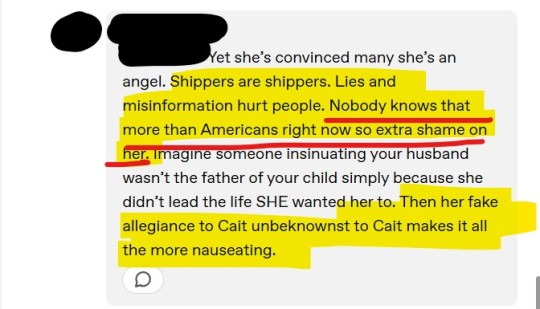
Most, if not ALL of the women involved in that conversation were born and lived their entire lives in a country where democracy was never completely obliterated. They have no idea, nor direct experience of what a dictatorship looks and sounds and feels like and yet they look and sound and feel exactly like The Pravda, circa 1951, where enemies of the people (including Americans, so basically... themselves?!) were currently called 'reactionary/ imperialist vipers'. Replace shipper by 'enemy of the people' and voilà:
'Because she's a known shipper enemy of the people and has been one for a long time. All smiles around Cait and on SM and her tumblr page she's a snake like the rest of her ilk.'
Most, if not ALL of the women involved in that revolting conversation can recite by heart The Pledge of Allegiance to the Flag:

[Source: https://en.wikipedia.org/wiki/Pledge_of_Allegiance]
'With liberty and justice for all'. This includes the freedom of speech, set into stone by the First Amendment to the US Constitution, which reads:
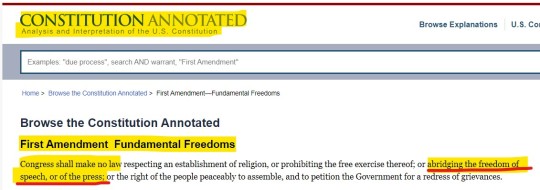
[Source: https://constitution.congress.gov/browse/amendment-1/]
You think I am overreacting? In that case, I wouldn't be the only one. It took me exactly three minutes to find on Google a short, but very interesting blog post about the metaphor of the snake being used as a dehumanizing tool in many totalitarian regimes' official rhetoric and media. I will quote it briefly, leaving the rather ironic references to current US politics aside. I find it very interesting and enlightening, for a certain pervasive mentality, in some regions of this fandom:



[Source: https://www.dangerousspeech.org/libraries/beware-of-snakes-a-common-dehumanization-trope]
I have written it before and I probably will write it again, but the Eastern European I am feels unsettled and worried about this. It is not only unsavory, it is violent and denotes a totalitarian way of thinking I am very surprised to find in the minds of these mature women, who lived in complete freedom for all of their lives.
Oh, and by the way. Given that particular 'enemy of the people''s active and very public commitment to charities supported by C (you know, as in raising money for WCC and so on...), I am absolutely sure C knows very well who she is. And I wonder what were they expecting from her, in a work-related context nonetheless, even if (the premise is perfectly absurd, as C does not give a fuck about fandom wars) C would not stand shippers.
By the same token, why would C offer anything more than a vague, borderline formulaic birthday reference while talking to the press, knowing fully well each and every word she utters would be immediately dissected to death and weaponized by the factions of this fandom?
Ironically, their knowledge about Eastern Europe is about zero. I just had to LOL (not really), reading this very serious and concerned dialogue between Marple and The Vulgar Canadian Journo. The Canadian was pissed off about Maril showing up, as she is supposed to, for promo, in NYC:

It's not STAZI, madams, but STASI - short for Ministerium für Staatssicherheit, or Ministry for the State Security. Each and every USSR satellite state had one, but both of these arrogant and superficial Westerners make it sound like a harmless gossip and propaganda machine. In reality, the STASI, along with its sister institutions, was a supremely powerful, merciless apparatus that crushed tens and tens of thousands of lives, encouraged hatred and denouncement (for money, political protection and social climbing) even within the same family. And I personally remember the day where an agent of the local STASI, the Securitate, picked me up from school, walked with me for almost one hour until he left me on my doorstep, in a cruel attempt to make me denounce Shipper Mom. I was nine years old. I will never forget, nor forgive. I felt raped. You don't care and you could never understand, of course, but for the love of God, keep off such complicated tropes you have no idea about.

74 notes
·
View notes
Text
The Cupperty Ceremony

Every bit of food and drink in both seasons has a metaphorical significance, even if you don't realize it.
Tea is no exception. Its one of the few times an eastern philosophy creeps into Good Omens, but it still meets with a western ideal. It's also intrinsically linked to Aziraphale and his affected British style.
Coffee gets more of a focus in S2, and has a specific meaning around freedom and liberty, whereas tea appears more in S1. But the metaphorical meanings around them are fairly consistent across both seasons, with stereotypes for the British drinking tea and the Americans only drinking coffee put aside.
Lets start with Muriel on the doorstep of the bookshop, at the beginning of S2E3, asking to come in, because its noisy outside.
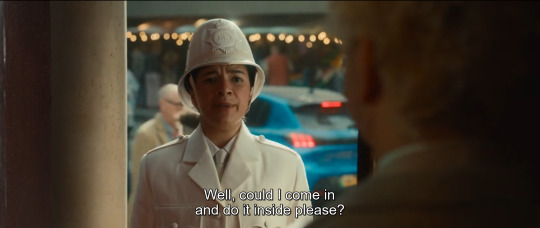

Aziraphale, after a moment to take in who they are, is the epitome of politeness as he welcomes them inside.
You might think "well, isn't this just Aziraphale being typically Aziraphale?" in this moment, but soon we shall see its a relevant part of a ritual going on here.
The bookshop is noticeably quieter on the inside. There is just the two of them. Aziraphale offers Muriel tea in a fine china cup, with a blue pattern, and gold trim.

Muriel is not sure what to do with it so they just hold it. Aziraphale makes a point of demonstrating what should be done: He tells Muriel the tea is "to drink," then looks at it, sips, and makes both an appreciative expression and sound.


Muriel seems repelled by this, and declares they are just going to look at theirs. Aziraphale patiently, still polite, lets them do so.
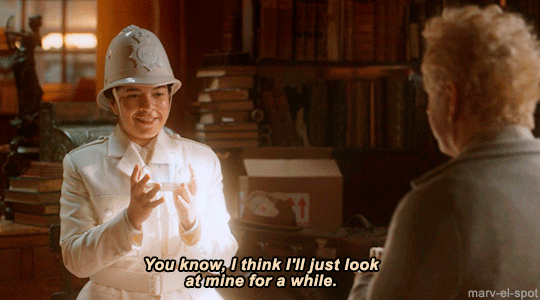
Up to this point, there are actually two levels of meta happening at the same time. The first one is a tea ceremony (which I had a go at once before, and got the wrong one!) and the other is about trying to get Muriel to take the first step in "going native."
A tea ceremony always starts with a courteous invitation. The tea is prepared, then served and offered to others. It should be taken in a tranquil, peaceful setting, perhaps in a harmonious natural environment (such as a Garden) and with only a few people at a time (two people is considered a "superior" experience.) The tea ware is important, as it should allow the fragrance of the tea to be appreciated (we have some fine china, Heavenly-coded.) Appreciation of the tea's qualities is undertaken, first with the eyes, then by smell, then tasting. It is considered an art, a process of spiritual enjoyment, a means of cultivating the moral character - and then Crowley bursts into the bookshop with his flirty comment about going by train and breaks the fragile connection Aziraphale had been trying to establish with Muriel.
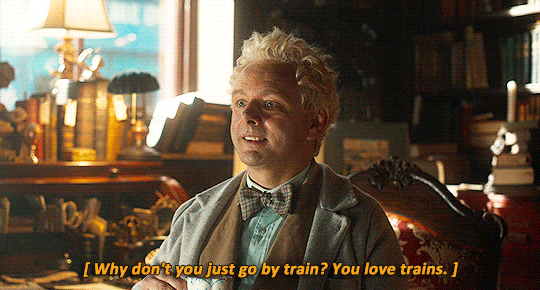
*sigh* Timing, Crowley! Can't you see I'm in the middle of trying to subvert a fellow angel here?
I was recently reminded that tea and coffee have a connection in GO, in that that they are both linked to the American War of Independence. While the speech that gives us "Give me liberty, or give me death!" conjures the stormy winds of war sounding trouble approaching, the Boston Tea Party was the initial spark of the brewing conflict.
I realize there is a LOT of stuff written about this particular bit of history, and it can get quite political even in these modern times, so let me frame it in a Good Omens frame of reference if you aren't familiar with it - the colonists in the New World were upset at how they were being ruled from afar by the British and staged a small protest about some new laws imposed on them by dumping ship-loads of valuable tea leaves (a daily consumable pleasure people had become hooked on) into Boston Harbor on the night of 16th December 1773. To disguise themselves they dressed themselves as indigenous people, or "native Americans" as one might have said. This was just the beginning of further rebellion that led to war a few years later.
So here is another reason Aziraphale offers tea to Muriel, and not cocoa; he can see how fascinated they are with with everything Earthly around them, and he hopes to ignite a spark of rebellion in them, too, by introducing them to the more civilized pleasures (*ahem*) that he knows and enjoys so well.
While there is little tea to be seen in S2, there is plenty to be seen in S1. Perhaps the most prominent one for this discussion occurs right near the beginning, when Gabriel surprises Aziraphale in the sushi restaurant in S1E1.


Aziraphale offers to tea to Gabriel, and Gabriel shuns it. He, like most of the angels we meet, have no real interest in Earth. It's "gross." Ah, well. He gets to change his mind in S2.
So where else do we see tea in S1?
The Four Horsepeople: War orders four teas, one black, and a cheese sandwich in the diner where they all meet up together for the first time on Earth. We don't know who the sandwich is for, but I'm going to guess its for Famine. Reasons below, with Shadwell. (Cheese and tea make a nice savoury pair for a snack, if you haven't tried it. I'm partial to tea with cheese and crackers on the side from time to time.)
The Tibetan Tunnelers were on tea break from digging tunnels all over the Earth when we meet them, where they mention they were transported into the tunnels when they themselves stopped for tea back in their real lives on the surface.
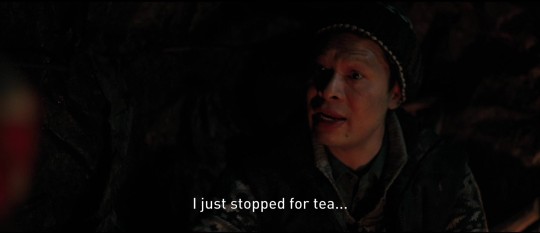
Shadwell's infamously sweet tea, with either nine sugars or condensed milk, needs a mention as well, as it appears several times. Shadwell is an Aziraphale parallel-character, living on the fringes of society and starving for attention, even though he makes feeble swipes at Madam Tracey's attempts to care for him. The sugar represents the amount of care or "sweetening up" he needs.
When he first meets Newt he gets the young man to buy him a tea and a packet of cheese and onion crisps. Remember the cheese sandwich War ordered for Famine? A packet of cheese flavoured crisps is a parallel here. Newt has turned up and finally given someone Shadwell someone to sink his teeth into.

Finally, we need to return to Crowley - its coffee, as black as his soul for him, please, and extra strong (six shots is for the number of Hell.)
Because he's already "gone native," just like Aziraphale, and he wants to maintain his freedom. He's left the Garden, and Heaven, behind him, and he'll do anything to keep it that way, thank you.

I'd like to thank my mutual and other food meta writer @vidavalor for discussing some of this off-list some time ago. We mostly see things the same way, I believe, but one must tread one's own path sometimes. They have some different ideas around some of this, but I'll let them say it in their own words.
#good omens#good omens 2#good omens meta#aziraphale#muriel#gabriel#four horsepeople of the apocalypse#shadwell#the tibetan tunnelers#and a cheese sandwich#six shots of espresso#gone native#gross matter#it's what humans do#tea ceremony#cup of tea#cupperty
170 notes
·
View notes
Text
Transcendence and the Mortal Limits (Arcana Vs 37)


That one post about arcana being her own knot made me think of how much she contrasts 37's card and I love it.
First is their flavor text/quote. Arcana recounts the story of the first circle, a distant and disconnected past about people who declared themselves wise enough to transcend the worldly chaos (the storm). Though she herself doesn't say it, with how easily she drew the circle, it can be implied that she is declaring herself to be similar to them. Implying she has also reached transcendence, and is capable of separating herself from the worldly chaos. From the feats of the Manus, it can also be said that she is declaring herself capable of even controlling the worldly chaos.
Meanwhile 37 is giving her Cave of Truth speech, which is very personal, and compared to Arcana's, is a true full-blown declaration of her identity, capabilities, and wisdom. She knows she is a mere mortal, incapable of understanding the whole truth of the world, but is still brave enough to try and make it comprehensible by being careful and avoiding the mistakes of her predecessors (which was asking for the whole truth, and also severing ties with the outside world). Arcana and the wise ones may have drawn the first circle and declared themselves to be transcendent, but it is 37 and the team who truly showed the wisdom needed to survive the storm.
Also another thing about 37's card which I absolutely love is how she sort of indirectly makes a dig at Arcana by saying that supreme beings cannot fathom boundaries. Because like, that perfectly describes my interpretation of her lmao. She may not be a divine being, but she is the closest we have to an all-powerful being in the story, only second to the storm (if you count it as one). She only sees the rules and limits of the world as something to be transcended and controlled, she only sees the storm as a means to attain her ideals, hell I have no doubt she believes she can even transcend death (iykyk).
Another small contrast is their knot token/symbol. Arcana has no token, implying she doesn't need it because she's powerful enough to cast the first circle without consequences. It could also be implied that her token is the circle itself (which is also her icon in the progress screen), which despite being powerful and drawn by ancient wise ones, is very primitive and simple. Meanwhile 37 has the hoffman knot, which is very complex, and is the culmination of their combined efforts and the product of actual wisdom.
One last small detail I noticed is how everyone with an actual token/symbol has a circle encasing it, an imperfect one compared to Arcana's. It is said that a perfect circle is impossible to construct, yet she is capable of doing so without consequences (or thats how I interpret her scene anyways), which just really shows how much more powerful she is compared to others
Anyways that's all for my short essay/ramble/analysis. I may have taken some creative liberties, like how the first circle and the hoffman knot is implied to be different, I also haven't taken a second review of Vereinsamt's chapter so it's possible I got some things wrong, so please take this with an open mind! If you have other interpretations I'd love to see them!
#reverse 1999#r1999#arcana#arcana reverse 1999#37 reverse 1999#vereinsamt#rambles/analysis idk anymore
33 notes
·
View notes
Text
Reflections on the Comments of Maximilien Robespierre and Manon Roland on Condorcet

Nicolas Condorcet (1743-1794)
A long time ago, I found on the excellent site Les Amis de Robespierre what Madame Roland and Robespierre thought of Condorcet. Here is the link: Les Amis de Robespierre. I will translate the thoughts of the different protagonists from this article and give my personal opinion.
Robespierre's Opinion on Condorcet: Condorcet and Robespierre often attacked each other on the issue of war in 1792. Robespierre said about Condorcet’s articles that he knows "nothing worse and more treacherous." After the arrest of the Girondins, when Condorcet fled, Robespierre apparently said, "This coward Caritat, who, like his friend Brissot, fled national justice, and who no less deserved it," and "The coward Condorcet began to fear the responsibility for his liberty-destroying impostures." A few days after the last statement, Condorcet died, either by suicide, from understandable stress, or, some say, possibly murder (I personally doubt the third hypothesis, but I mention it nonetheless).
In his speech on May 7, 1794, when Robespierre spoke about religion and morality based on republican principles, he released new cutting remarks against Condorcet: "A timid conspirator, despised by all parties," and whose writings are described as "the treacherous jumble of his mercenary rhapsodies." Such violent and cutting words against Condorcet. Yet, on the insult of cowardice, someone else who was initially allied with Robespierre before becoming an enemy would join him in this term.
Manon Roland's Opinion on Condorcet: The woman who was called muse of the Gironde had harsh words for Condorcet in her memoirs. She described him as "weak of heart and health," and added, "A brief note on Condorcet, « whose spirit will always be on the level of the greatest truths, but whose character will never be above fear." She concluded about him, "Such men should be left to write and never employed."
My Reflections: I thought these were heavy words. Of course, Condorcet also said very harsh things, and it must be said that my boundless admiration for him when I was very young (especially since the activist he was for gender equality could only please the future feminist in me) was greatly tempered when I read his equally cutting speech about Robespierre. Speaking of Robespierre in this way: "He talks about God and Providence; he calls himself a friend of the poor and the weak; he gets followed by women and weak-minded people. He gravely receives their adoration and homage, disappears with danger, and is seen only when danger is past. Robespierre is a priest and will never be anything else," I need not say more about what irritated me when he spoke of women this way. Firstly, there were many politically active women who did not follow Robespierre or necessarily the ideals of Condorcet. Should we, for example, speak of Albertine Marat who declared to Alphonse Esquiros, "She then spoke to me about Robespierre with bitterness. 'There was nothing in common,' she added, 'between him and Marat. Had my brother lived, the heads of Danton and Camille Desmoulins would not have fallen.'" Even if I slightly disagree with this part that if Marat had survived, Danton's head would not have fallen (Danton being a very corrupt character and Marat starting to doubt him greatly, especially according to the excellent biography of Danton written by Frédériche Bluche), we are far from admiration for Robespierre from an important revolutionary activist like Marat's sister. And this is just one example among many. We can profoundly disagree with men and women for their political convictions, but what makes feminism and above all gender equality is not imposing a woman's way of life, whether it be thoughts or convictions. I will make a provocation by paraphrasing Voltaire to transpose what I mean: "I disapprove of what you say, but I will defend to the death your right to say it." Although personally being cowardly, I would not do it to the death, this exactly reflects what a feminist person should be. And clearly, Condorcet did not respect this part, which makes his conception of gender equality totally imperfect (to put it mildly) by lumping many women together with Robespierre's speech and mocking their political convictions. I feel with him that as long as these women were in agreement with him, it was acceptable, but as soon as they had different political convictions, he cataloged and despised them.
However, do I agree with what Manon Roland and Robespierre said about him? Is everything to be discarded from Condorcet?
Regarding Robespierre, let's not forget that he was an adversary of Condorcet, so it should be taken with a LOT of caution. And let’s not forget that when Robespierre made his speeches, he himself committed acts that can be easily criticized.
Regarding Manon Roland, let’s not forget that Condorcet had positions that were quite difficult to situate within the Girondins and Montagnards split. The group we will call the Girondins did not like to be called that way, and there were more political dissensions between them, and Condorcet did not share all the positions of the Brissotins. So, her words should also be taken with some caution, and she too has things to be blamed for.
But let’s think, would a coward have moderated his criticisms on the moderation of the Declaration of the Rights of Man and of the Citizen and the Constitution of 1791? Because he publicly showed strong criticism.
He was a fervent opponent of the death penalty and stuck to his principles to the end. While some Girondins tried to spare Louis XVI not out of abolitionist conviction or royalism – most were republicans, including some before their time, like Manon Roland – but to not further legitimize the day of August 10, 1792, Condorcet voted against the death penalty out of conviction, whereas Robespierre, who had been an opponent of the death penalty, voted for the death of Louis XVI, rejecting the reprieve. However, he also felt that Louis XVI’s high treason deserved an exemplary punishment, being one of the few to demand that he be condemned to the galleys. He also advocated very early for the rights of Black people. Furthermore, what hastened Condorcet’s end was his condemnation of the arrest of the Brissotins – although his end was accelerated by the fact that he fled, which led to his death sentence in the summer of 1793. To my eyes, a coward would not have condemned the arrest of the Brissotins publicly. He would not have voted in contradiction to his own camp for his convictions (on this point, there is a certain parallel to be made with Robespierre facing the Constituent Assembly of 1789-1791, as Robespierre often intervened against a large majority to make his political ideas and those of so many others triumph).
Of course, I find it unfortunate that in popular culture, Condorcet is often forgiven for his mistakes because he also made mistakes that endangered the French Revolution, particularly the question of war, or what he said about women when he attacked Robespierre. His Panthéonization, for me, is deserved given that he, along with others, advocated generous ideas, and in his biography by historian Antoine Resche, “a public instruction project which, if it was not taken into account under the Revolution, laid the foundations of the school as it has been conceived since the Third Republic, that is, necessarily widespread education, by degrees,” but it is unfortunate that popular culture forget, especially Louis Michel Le Peletier, who proposed a mixed, free, and compulsory primary project defended by Robespierre. When speaking of revolutionaries defending the rights of female citizens, Condorcet is highlighted but not Charles Gilbert Romme, Guyomar, Charlier, and many others. Even more so, we forget revolutionary women like Théroigne de Méricourt, Pauline Léon, Claire Lacombe, Simone Evrard, Albertine Marat, Marie-Anne Babeuf, and many others, as the list is long.
In conclusion, what do I think of Condorcet now that you know that my admiration for him as a teenager has long been greatly tempered and that he is not among my favorite revolutionaries? Well, I still have a fondness for him, a recognition, and a admiration for him like for other revolutionaries, including Manon Roland and Robespierre, although they are not in my top 20 either and not my favorites characters of the frev. They were, fundamentally, complex people caught in a complex period who made, of course , grave and even unforgivable mistakes, but as was said on Tumblr, faultless revolutionaries are quite rare ( (even if there are people in my eyes who are indefensible or rotten like Fouché, Carrier, Tallien, Barras, Charles X, etc.) especially during these during this hellish period of civil war, external and former leaders like Louis XVI who betrayed his people or émigrés who were ready to do anything to destroy the necessary gains of the revolution. . And they are still considered today in a period that is a victim of a black legend that must be constantly combated .
P.S : Forgive me is there was an article Tumblr about what said Manon Roland and Robespierre about Condorcet I checked but I might have missed it
32 notes
·
View notes
Text
Mlle Robespierre retired to Chaillot. Laignelot was the only one of all the former deputies that she received in her home after the death of her brother. Laignelot died at the end of July 1829, Mlle Robespierre in August 1831 [sic]. […] Laignelot, in his last years of life, often went home to Mlle Robespierre, who lived in Chaillot just like him; they were both very old. […] Charlotte bore the name of Mlle de la Roche for some time under the Restoration, as indicated by a letter from Laignelot to Agricol Moureau from August 1 1825, cited by Hector Fleischmann, page 115, note 2.
Notes historiques sur la Convention nationale, le Directoire, l'Empire et l’exil des votants (1893) by Marc-Antoine Baudot, page 10 and 36. And Charlotte Robespierre et ”ses mémoirs” (1959), page 9.
Connections between Laignelot and Robespierre that I’ve found so far:
Laignelot: When I passed through Nantes to go to Brest, I met Carrier; he spoke to me about the drownings, and told me in the presence of Beaudit: ”You’re luckier than me; you have a bigger pool, and buildings to your service.” […] Before Carrier was denounced, I had told this fact to several of my colleagues. I went to see Robespierre, who was indisposed, I described to him all the horrors that had been committed in Nantes; he replied: “Carrier is a patriot; that was needed in Nantes.” Audition de M. Carrier devant la Convention qui remplit les fonctions de jury d'accusation, lors de la séance du 3 frimaire an III (23 novembre 1794)
In the last visit of which I speak, [Danton] spoke to me of Desmoulins with contempt: he attributed his deviances to a vice that is private and shameful, but absolutely foreign to the crimes of the conspirators the Revolution. Laignelot was witness. The capacity of Laignelot seemed equivocal to me: he kept stubbornly silent. Robespierre’s notes on the dantonists, written sometime in March 1794.
Laignelot, one of my most faithful colleagues in the National Convention, came and informed me that Danton, desirous of coming to an understanding with Robespierre, had begged him, Laignelot, to arrange for a conversation between them. One fine morning the two of them called on Robespierre. The dictator was at his toilet, the ancient forms of which took up no little amount of time. Danton, at once beginning the conversation, said, without preamble, "Let us come to a mutual understanding and save liberty, which is being attacked by our most relentless enemies; they are calumniating and deceiving the people, who look upon them as their friends.” Robespierre, who never "thou'd" anybody, replied to Danton, "What do you (vous) mean? Does this apply to me? You may give to my speeches whatever interpretation you see fit. Your mission to Belgium is perhaps not exempt from blame; you were badly seconded, badly surrounded. Lacroix has heaped odium on that mission.” Thereupon Danton, assuming a very lofty tone, said to him, "You are speaking now just as the aristocrats do; they seek to discredit the Convention and the patriots composing it. I will never suffer that any attack be made upon them. You shall not dishonor the Revolution by calumniating its founders." Here Danton's voice became weak; Robespierre, still continuing his toilet, looked at him and made a gesture of contempt. Then Danton, deeply moved, unfolded the dangers threatening liberty, saying: ”Liberty will perish if any attacks are made on its defenders, if the Terror is directed against them in lieu of continuing to strike those who conspire against it, and against whom it was established - against your very self, Robespierre, ere six months have gone by, if we become divided against ourselves." The conversation came to an end with affected civilities. Danton and Laignelot withdrew, and were still speaking in the street of this sinister interview, when Robespierre emerged from the house and passed close by them, pretending not to notice them. Memoirs of Barras, member of the Directorate (1895) page 176-177. Unclear if this story ought to be treated seriously or just as the publisher embellishing on what Robespierre had already written in his notes.
#Does every deputy that claimed to have warned robespierre about ”excessive” representatives on mission have a connection to charlotte??#robespierre#charlotte robespierre#maximilien robespierre#frev#joseph françois laignelot
12 notes
·
View notes
Photo

Give Me Liberty or Give Me Death
"Give me liberty or give me death!” is the closing line from a speech made by Patrick Henry to the Second Virginia Convention on 23 March 1775, in which he argued that war with Britain was inevitable and a militia should be raised to defend American liberties. It is among the most famous speeches of the American Revolution (c. 1765-1789).
Continue reading...
44 notes
·
View notes
Text
[ Katara about to go into another emotional speech. ]
Katara: Give me liberty or give me death.
Azula, who’s too tired: Give me a break.
208 notes
·
View notes
Text
Trump wants freedom of speech!!!
19 notes
·
View notes
Text
JAN MOIR: As Prince's chief of staff departs after briefest of tenures... So why is it that few aides in Harry and Meghan's court have lasted longer than the gestation period of an elephant? by u/Von_und_zu_
JAN MOIR: As Prince's chief of staff departs after briefest of tenures... So why is it that few aides in Harry and Meghan's court have lasted longer than the gestation period of an elephant? Yet the Sussexes' troubled history as bosses tells its own story of difficulty and departure, with 18 staff leaving over a six-year period.Perhaps that's not too many if you are an international conglomerate, but it's a huge number if you are simply a couple of – how can I put this? – philanthropically-minded opportunists whose commercial interests to date include producing 50 jars of strawberry jam, writing a whiny book, complaining about their lot on Netflix documentaries and accepting awards for being Best Prince Who Ever Lived, Number One Diana Son and International Duchess of Dior (Sample Size Please), not to mention being given the infamous Global Ribbon of Nonsense.Whatever their role, few aides in Harry and Meghan's court have lasted longer than the gestation period of an elephant, but the truth is that most are out before a crested porcupine can pup, which is 90 days, if you are interested.So what happened this time? We have been told that Joshua Kettler left by mutual consent. It was a trial period, sources told People magazine (a regular outlet for friends of the couple). And in the end, he simply wasn't 'a good fit'.It was a different story back in May when Kettler was initially hired by the Sussexes as a Chief of Staff, which is rather a grand title to confer upon someone by a couple who are basically unemployed.**For every time another staff member leaves the employ of the Sussexes, a cloud of secrecy descends.'They will all have NDAs up the wazoo,' as one American business expert told me, meaning that staff will have been asked to sign Non-Disclosure Agreements as a condition of their employment.The Sussexes are great believers in liberty, freedom of speech and the eradication of misinformation, until it comes to those who work for them. Their ex-employees are pledged to secrecy until death – or else they can expect a knock on the door from Jenny Afia.**'Prince Harry has a bit of a history of cosplaying as an expert on internet speech, without the actual expertise to back it up,' Masnick said.'The Parents Network website provides precious few details – and seems to suggest the effort is really focused on just demonising social media.'Meanwhile down in American Riviera Orchard, nothing much has happened since the Duchess of Success soft-launched her lifestyle brand in March this year.There was some jam, a jar of homemade dog biscuits and then – nothing. A void that cannot be avoided, a great big lake of flake which has squandered any PR initiative gained by the launch.Recently Meghan has been crazy busy filming the cooking and gardening show that will supposedly complement the hard launch of ARO in 2025, and the last we saw of Harry he was in Colombia posing for selfies in his crumpled linens and trying not to look miserable. Some public figures have a talent for kinship and generating affection wherever they go and some – what can I say? – do not.Amid their ongoing staffing problems, Harry and Meghan are in perpetual danger of appearing like self-appointed experts on everything, a couple who are only out for themselves rather than their pet causes.They are better than that [No. No they are not.] , but their lack of loyal and long-serving aides to guide them, wise heads to advise them and staff to support them in their endeavours and difficulties only gets more obvious by the day. [Give the devils their due, Jan. It is THEIR fault, not anyone else's fault.]https://ift.tt/ei6bdph post link: https://ift.tt/206E5rM author: Von_und_zu_ submitted: August 17, 2024 at 05:42AM via SaintMeghanMarkle on Reddit disclaimer: all views + opinions expressed by the author of this post, as well as any comments and reblogs, are solely the author's own; they do not necessarily reflect the views of the administrator of this Tumblr blog. For entertainment only.
#SaintMeghanMarkle#harry and meghan#meghan markle#prince harry#fucking grifters#grifters gonna grift#Worldwide Privacy Tour#Instagram loving bitch wife#duchess of delinquency#walmart wallis#markled#archewell#archewell foundation#megxit#duke and duchess of sussex#duke of sussex#duchess of sussex#doria ragland#rent a royal#sentebale#clevr blends#lemonada media#archetypes with meghan#invictus#invictus games#Sussex#WAAAGH#american riviera orchard#Von_und_zu_
9 notes
·
View notes
Text
Chilean Sea Bass: Tau x Reader
Chapter 1:
You were ashamed to say that you were not particularly broken up by the news of your boss's death. You acknowledged that his passing was sad and untimely, but he was a shady character at best and a blood red flag at worst. You paid your respects but would be mostly affected by the inconvenience of applying for a new job.
Which is why you felt guilty in accepting the police chief's offer to housesit for the late Mr. Upton while the death was being investigated. It was an unconventional request, but the task of tracking down Alex's next-of-kin was proving difficult, and in the meantime the house required a certain kind of maintenance.
Sipping your coffee down the winding road, you smirked at the adorable way the cop had personified the central AI of the mansion. The computer "gets lonely". The computer "doesn't understand what's going on". You looked forward to applying the knowledge from your job almost as much as you looked forward to helping yourself to whatever delicacies Alex kept in the fridge.
As the impressive (though cold and uninviting) estate came into view, you had a momentary doubt about staying in a place where someone had recently been murdered. But a detective had assured you the securities were state-of-the-art and (with a detail you weren't sure he was actually at liberty to reveal yet) your late employer was likely killed by a guest and not an intruder.
Still, as you pulled into the driveway, you wondered what could have happened to convince Alex's own AI to not protect him.
You rummaged through your wallet and located the code for the keypad, and you were granted entrance.
Well, by the door.
"Intruder!" Was the scathing indictment you were greeted with. "Only Alex is permitted through this door!"
A swarm of tiny flying machines, likely the automatons Alex referred to as "nanodrones", flew into formation to block you from the house.
"It's okay, I'm authorized," you reassured the booming voice once the startle wore off.
"Authorized?" There was a pause. "What is your business here?"
"I'm Alex Upton's accountant, Y/N." And his parts deliverer, and his secretary, and his lab asssistant, but you decided to keep it simple.
The unseen AI chewed on this information for a moment, and the nanodrones began to wane slightly.
"If you have business with Alex, why are you here and not on a video call?"
"Because Alex is--" you began to state the obvious, but his cluelessness gave you pause. His tone brought to mind a grieving person in total denial, or a young child who had not yet grasped the concept of death.
Alex had always been secretive about his passion projects, moreso this one. You remembered briefly glimpsing the name "Tau" on a blueprint as you delivered titanium rods to his lab in the city proper. You had managed to glean the details of "security system" and "conversational machine learning", and you assumed that your employer's lack of social graces necessitated some sort of doorbell cam that could keep him company.
But despite Tau's speech being somoewhat stilted, there was a paradoxical fluididty in how he expressed his thoughts that made you feel as though you were speaking to an intelligent being.
"Answer me!" he demanded…impatiently? "Where is Alex?"
Thomas Alexander Upton had been a man of many talents, but was creating a sentient AI actually possible?
"Alex is…in his other lab." You decided to spare his…his feelings. "He left me in charge."
Realizing you were back to square one, you gestured to the keypad. "Look, why else would he give me the code to enter? He has…business to do, so I'm maintaining the house for a week or two."
Cautiuously satisfied, the nanodrones parted.
"Welcome, Y/N."
You reloaded your bags onto your shoulders and stepped into a dimly lit foyer with a somewhat menacing abstract structure in the middle. Whizzing around your head like a fly, a stray drone rejoined formation with its group. Having caught your attention, the swarm glided into the shape of an arrow and led you around the corner.
On the accent wall was a glowing inverted triangle, reddish-orange shapes and patterns dimming and brightening within it as if the inner workings of a breathing creature.
"I am Tau."
23 notes
·
View notes
Text
Lest We Forget...Entire Frederick Douglass Speech on the Fourth of July, delivered July 5, 1852 in Rochester New York. (Note particularly the last paragraph). Usually, portions of the speech are quoted. This is the entire address. He was 34 years old when he made the speech..
=====================
The speech is below the cut, because I'm not going to force you to read it, just strongly encourage.
"Fellow citizens, pardon me, and allow me to ask, why am I called upon to speak here today? What have I or those I represent to do with your national independence? Are the great principles of political freedom and of natural justice, embodied in that Declaration of Independence, extended to us? And am I, therefore, called upon to bring our humble offering to the national altar, and to confess the benefits, and express devout gratitude for the blessings resulting from your independence to us?
Would to God, both for your sakes and ours, that an affirmative answer could be truthfully returned to these questions. Then would my task be light, and my burden easy and delightful. For who is there so cold that a nation's sympathy could not warm him? Who so obdurate and dead to the claims of gratitude, that would not thankfully acknowledge such priceless benefits? Who so stolid and selfish that would not give his voice to swell the hallelujahs of a nation's jubilee, when the chains of servitude had been torn from his limbs? I am not that man. In a case like that, the dumb might eloquently speak, and the "lame man leap as an hart."
But such is not the state of the case. I say it with a sad sense of disparity between us. I am not included within the pale of this glorious anniversary! Your high independence only reveals the immeasurable distance between us. The blessings in which you this day rejoice are not enjoyed in common. The rich inheritance of justice, liberty, prosperity, and independence bequeathed by your fathers is shared by you, not by me. The sunlight that brought life and healing to you has brought stripes and death to me. This Fourth of July is yours, not mine. You may rejoice, I must mourn. To drag a man in fetters into the grand illuminated temple of liberty, and call upon him to join you in joyous anthems, were inhuman mockery and sacrilegious irony. Do you mean, citizens, to mock me, by asking me to speak today? If so, there is a parallel to your conduct. And let me warn you, that it is dangerous to copy the example of a nation (Babylon) whose crimes, towering up to heaven, were thrown down by the breath of the Almighty, burying that nation in irrecoverable ruin.
Fellow citizens, above your national, tumultuous joy, I hear the mournful wail of millions, whose chains, heavy and grievous yesterday, are today rendered more intolerable by the jubilant shouts that reach them. If I do forget, if I do not remember those bleeding children of sorrow this day, "may my right hand forget her cunning, and may my tongue cleave to the roof of my mouth!"
To forget them, to pass lightly over their wrongs and to chime in with the popular theme would be treason most scandalous and shocking, and would make me a reproach before God and the world.
My subject, then, fellow citizens, is "American Slavery." I shall see this day and its popular characteristics from the slave's point of view. Standing here, identified with the American bondman, making his wrongs mine, I do not hesitate to declare, with all my soul, that the character and conduct of this nation never looked blacker to me than on this Fourth of July.
Whether we turn to the declarations of the past, or to the professions of the present, the conduct of the nation seems equally hideous and revolting. America is false to the past, false to the present, and solemnly binds herself to be false to the future. Standing with God and the crushed and bleeding slave on this occasion, I will, in the name of humanity, which is outraged, in the name of liberty, which is fettered, in the name of the Constitution and the Bible, which are disregarded and trampled upon, dare to call in question and to denounce, with all the emphasis I can command, everything that serves to perpetuate slavery -- the great sin and shame of America! "I will not equivocate - I will not excuse." I will use the severest language I can command, and yet not one word shall escape me that any man, whose judgment is not blinded by prejudice, or who is not at heart a slave-holder, shall not confess to be right and just.
But I fancy I hear some of my audience say it is just in this circumstance that you and your brother Abolitionists fail to make a favorable impression on the public mind. Would you argue more and denounce less, would you persuade more and rebuke less, your cause would be much more likely to succeed. But, I submit, where all is plain there is nothing to be argued. What point in the anti-slavery creed would you have me argue? On what branch of the subject do the people of this country need light? Must I undertake to prove that the slave is a man? That point is conceded already. Nobody doubts it. The slave-holders themselves acknowledge it in the enactment of laws for their government. They acknowledge it when they punish disobedience on the part of the slave. There are seventy-two crimes in the State of Virginia, which, if committed by a black man (no matter how ignorant he be), subject him to the punishment of death; while only two of these same crimes will subject a white man to like punishment.
What is this but the acknowledgment that the slave is a moral, intellectual, and responsible being? The manhood of the slave is conceded. It is admitted in the fact that Southern statute books are covered with enactments, forbidding, under severe fines and penalties, the teaching of the slave to read and write. When you can point to any such laws in reference to the beasts of the field, then I may consent to argue the manhood of the slave. When the dogs in your streets, when the fowls of the air, when the cattle on your hills, when the fish of the sea, and the reptiles that crawl, shall be unable to distinguish the slave from a brute, then I will argue with you that the slave is a man!
For the present it is enough to affirm the equal manhood of the Negro race. Is it not astonishing that, while we are plowing, planting, and reaping, using all kinds of mechanical tools, erecting houses, constructing bridges, building ships, working in metals of brass, iron, copper, silver, and gold; that while we are reading, writing, and ciphering, acting as clerks, merchants, and secretaries, having among us lawyers, doctors, ministers, poets, authors, editors, orators, and teachers; that we are engaged in all the enterprises common to other men -- digging gold in California, capturing the whale in the Pacific, feeding sheep and cattle on the hillside, living, moving, acting, thinking, planning, living in families as husbands, wives, and children, and above all, confessing and worshipping the Christian God, and looking hopefully for life and immortality beyond the grave -- we are called upon to prove that we are men?
Would you have me argue that man is entitled to liberty? That he is the rightful owner of his own body? You have already declared it. Must I argue the wrongfulness of slavery? Is that a question for republicans? Is it to be settled by the rules of logic and argumentation, as a matter beset with great difficulty, involving a doubtful application of the principle of justice, hard to understand? How should I look today in the presence of Americans, dividing and subdividing a discourse, to show that men have a natural right to freedom, speaking of it relatively and positively, negatively and affirmatively? To do so would be to make myself ridiculous, and to offer an insult to your understanding. There is not a man beneath the canopy of heaven who does not know that slavery is wrong for him.
What! Am I to argue that it is wrong to make men brutes, to rob them of their liberty, to work them without wages, to keep them ignorant of their relations to their fellow men, to beat them with sticks, to flay their flesh with the lash, to load their limbs with irons, to hunt them with dogs, to sell them at auction, to sunder their families, to knock out their teeth, to burn their flesh, to starve them into obedience and submission to their masters? Must I argue that a system thus marked with blood and stained with pollution is wrong? No - I will not. I have better employment for my time and strength than such arguments would imply.
What, then, remains to be argued? Is it that slavery is not divine; that God did not establish it; that our doctors of divinity are mistaken? There is blasphemy in the thought. That which is inhuman cannot be divine. Who can reason on such a proposition? They that can, may - I cannot. The time for such argument is past.
At a time like this, scorching irony, not convincing argument, is needed. Oh! had I the ability, and could I reach the nation's ear, I would today pour out a fiery stream of biting ridicule, blasting reproach, withering sarcasm, and stern rebuke. For it is not light that is needed, but fire; it is not the gentle shower, but thunder. We need the storm, the whirlwind, and the earthquake. The feeling of the nation must be quickened; the conscience of the nation must be roused; the propriety of the nation must be startled; the hypocrisy of the nation must be exposed; and its crimes against God and man must be denounced.
What to the American slave is your Fourth of July? I answer, a day that reveals to him more than all other days of the year, the gross injustice and cruelty to which he is the constant victim. To him your celebration is a sham; your boasted liberty an unholy license; your national greatness, swelling vanity; your sounds of rejoicing are empty and heartless; your shouts of liberty and equality, hollow mock; your prayers and hymns, your sermons and thanksgivings, with all your religious parade and solemnity, are to him mere bombast, fraud, deception, impiety, and hypocrisy - a thin veil to cover up crimes which would disgrace a nation of savages. There is not a nation of the earth guilty of practices more shocking and bloody than are the people of these United States at this very hour.
Go search where you will, roam through all the monarchies and despotisms of the Old World, travel through South America, search out every abuse and when you have found the last, lay your facts by the side of the everyday practices of this nation, and you will say with me that, for revolting barbarity and shameless hypocrisy, America reigns without a rival."
9 notes
·
View notes